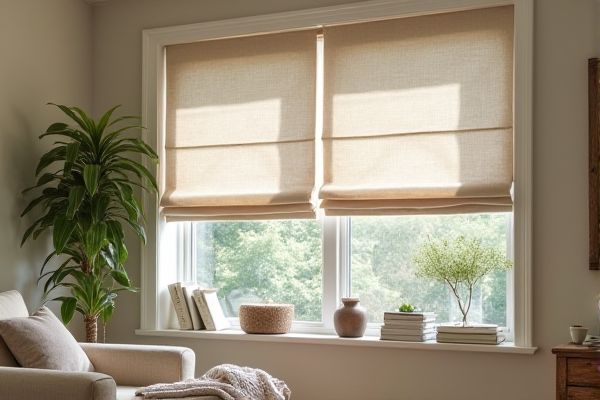
Roman shades offer a soft, elegant look with fabric that folds neatly when raised, providing a classic and decorative window treatment. Roller shades, on the other hand, deliver a sleek, minimalist style with a smooth, continuous fabric that rolls up compactly; explore the rest of this article to determine which style best suits your home and preferences.
Table of Comparison
| Feature | Roman Shade | Roller Shade |
|---|---|---|
| Design | Soft fabric folds for a layered look | Flat fabric rolls into a tube |
| Light Control | Moderate to high, depends on fabric | High, with blackout options available |
| Installation | Mounted inside or outside window frame | Mounted inside or outside window frame |
| Maintenance | Requires gentle cleaning, spot clean | Easy to wipe clean or vacuum |
| Style | Elegant, classic, adds texture | Minimalist, modern, sleek lines |
| Space Efficiency | Less compact when raised | Very compact when rolled up |
| Cost | Generally higher due to fabric & craftsmanship | Typically more affordable |
| Durability | Fabric may wear over time | Durable, especially with synthetic fabrics |
Introduction to Roman Shades and Roller Shades
Roman shades feature soft fabric panels that fold into elegant pleats when raised, offering a classic and decorative window treatment ideal for traditional and contemporary interiors. Roller shades consist of a single piece of fabric that rolls up smoothly onto a tube, providing a minimalist design that maximizes light control and privacy. Both options vary in fabric choices, light filtration levels, and installation methods, catering to diverse aesthetic preferences and functional needs.
Key Differences Between Roman and Roller Shades
Roman shades feature fabric panels that fold neatly into pleats when raised, creating a soft, elegant look ideal for formal or traditional settings. Roller shades consist of a single continuous piece of fabric that rolls up smoothly onto a tube, offering a minimalist and modern aesthetic with easy operation. Your choice depends on whether you prefer the textured, layered appearance of Roman shades or the sleek, simple design and functionality of roller shades.
Design and Aesthetic Appeal
Roman shades offer a soft, elegant look with fabric folds that create a layered texture, adding warmth and sophistication to any room. Roller shades provide a sleek, minimalist design ideal for modern interiors with smooth, uniform surfaces that complement clean lines. Your choice depends on whether you prefer the classic charm of Roman shades or the contemporary simplicity of roller shades for enhancing your space's aesthetic appeal.
Material and Fabric Options
Roman shades offer a rich variety of materials, including luxurious fabrics like silk, linen, and cotton blends, which provide a soft, textured appearance and excellent light diffusion. Roller shades typically use synthetic materials such as vinyl or polyester, designed for durability, easy cleaning, and moisture resistance, making them ideal for high-humidity areas like kitchens and bathrooms. Your choice depends on whether you prioritize the elegant softness of Roman fabrics or the practical, sleek functionality of roller shade materials.
Light Control and Privacy Features
Roman shades offer layered fabric that provides soft, adjustable light control and enhanced privacy with their thick folds, making them ideal for rooms needing variable ambiance. Roller shades deliver sleek, uniform coverage that effectively blocks or filters light, often equipped with blackout or light-filtering materials for superior privacy. Both options enhance room aesthetics while tailoring light and privacy levels through different mechanisms and fabric choices.
Installation and Maintenance
Roman shades require a more intricate installation process due to their fabric folds and multiple mounting points, often necessitating professional assistance for precise alignment and tension. Maintenance involves regular dusting and occasional spot cleaning to preserve fabric integrity, with fabric removal typically more involved compared to roller shades. Roller shades offer simpler installation, typically using brackets that secure the rolling mechanism, and allow easy fabric removal for straightforward cleaning or replacement, making them more user-friendly for routine upkeep.
Durability and Longevity
Roman shades, crafted from layered fabric, offer moderate durability but may require more frequent maintenance due to fabric wear and potential fading. Roller shades, made with materials like vinyl or polyester, exhibit superior durability and resistance to moisture and sunlight, contributing to a longer lifespan. For environments prone to humidity or direct sunlight, roller shades provide enhanced longevity compared to the more delicate Roman shades.
Cost Comparison
Roman shades typically cost more than roller shades due to their intricate fabric folds and tailored construction, making them a premium window treatment option. Roller shades offer a more budget-friendly choice with simpler designs and easier installation, which can reduce overall expenses. Your decision may depend on balancing aesthetic preference with the cost considerations of each shade type.
Energy Efficiency and Insulation
Roman shades provide superior insulation due to their layered fabric folds that trap air, enhancing energy efficiency by reducing heat loss in winter and heat gain in summer. Roller shades, typically made from a single fabric layer, offer moderate energy savings but can be less effective at insulating compared to Roman shades. Your choice between these options should consider the balance between aesthetic appeal and the level of thermal insulation needed for your space.
Choosing the Best Shade for Your Space
Roman shades offer a classic, textured look with soft folds that add warmth and elegance, ideal for living rooms or bedrooms seeking a cozy ambiance. Roller shades provide a sleek, minimalist design with smooth, flat panels, perfect for modern spaces requiring easy light control and privacy. Your choice depends on the desired aesthetic, fabric preferences, and the level of light filtration or insulation needed for your room.
 homyna.com
homyna.com